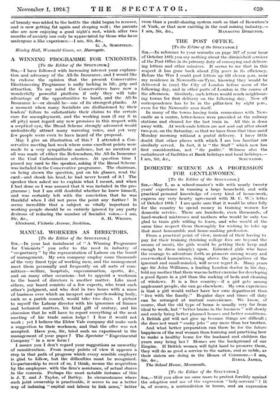MANUAL WORKERS AS DIRECTORS.
[TO the Editor of the SPECTATOR.]
SIR,—In your. last instalment of " A Winning Programme for Unionists." you refer to the need in industry of " co-partnery " by. the representation of Labour on the board of management. My own company employ some thousands of the very finest type of working men, and the management meet them personally and frequently on all sorts of com- mittees—welfare, hospitals, superannuation, sports, &c., and on. many other occasions—but. to appoint a workman to the board of. directors is another matter. Like most others, our board consists of a. few experts, who trust each other's judgment, and who deal in two hours with a mass of business over which an inexpert and speech-making body, such as a parish council, would take two days. I picture to myself the Labour director with his ignorance of finance and technical matters, his fatal gift of oratory, and his obsession that he will have to report everything at the next. meeting of his trade union lodge I fear it would not- work ; yet I believe the Ebbw Vale company did make such. a suggestion to their workmen, and that the offer was not accepted: Have you, Sir, tried such an experiment- in the management of your paper ? The Spectator " Experimental Company " in a new form I I assure you I don't regard your suggestions as unworthy of consideration. From many points of view it appears a. step in that path of progress which every sensible employer is glad to follow, but the difficulties must be recognized. Co-partnership to most of us, I think; means the acquisition by the employees. with the firm's assistance, of actual shares in the concern.. Perhaps- the most notable instance of this is J. T. and J. Taylor, of Batley. In circumstances where such joint ownership is practicable, it seems to me a. better _way of inducing_" capital and labour to link arms," better
even than a profit-sharing system such as that of Rowntree's at York, or that now existing in the coal mining industry.










































 Previous page
Previous page